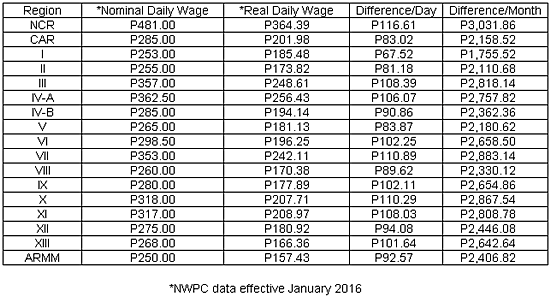10.3 million
workers upset as value of daily salary fell by P97 a day nationwide
due to inflation
By TUCP
March 20, 2016
QUEZON CITY – Amid
the country’s impressive Gross Domestic Product average growth rate of
6 percent last year, a combined 10.3 million workers were affected as
the daily minimum wage levels nationwide fell by an average of P96.95
a day or P2,520 a month starting January this year due to inflation,
the labor group Trade Union Congress of the Philippines-Nagkaisa (TUCP-Nagkaisa)
said.
Quoting data from the
National Wages and Productivity Commission (NWPC) data released
February 12, the group said the real value of the P481 nominal daily
minimum wage in the 17 cities and municipalities in Metro Manila, for
example, is worth P364.39 a day beginning January this year. The
nominal value fell by P116 a day or P3,016 a month.
“The lost value of the daily
wage can buy them a kilo of imported, first class, deliciously
fragrant rice and three variant of pagpag food for one good meal the
entire family have not eaten for years. But if we look at the entire
value lost in a month, it can cover for house rent, or water and
electricity, or tuition fees,” said TUCP spokesperson Alan Tanjusay.
Real wage are wage in terms
of the amount of goods and services that can be bought. For example,
the current capacity of daily nominal minimum wage of P250 in
Autonomous Regions of Muslim Mindanao (ARMM) to buy goods and pay for
services in the region is only P157.43. The nominal value fell by
P92.57 a day or P2,406.82 a month.
The difference between wage
and cost of goods and services is shown in the recent government
survey showing a combined 10.348 million unemployed and underemployed
workers dissatisfied with their salary because of the rising costs of
services and the increasing prices of commodities reaching almost
eight million, he said quoting recent data of the government’s Labor
Force Survey (LFS) released ten days ago.
The LFS according to the
Philippine Statistics Authority (PSA) released on March 11, out of
67.153 million work force, there are 40.047 employed Filipinos and
7.879 million of which are underemployed while 2.469 million are
jobless.
“The painful implication is
that there are almost 8 million working Filipinos who do not progress
because they cannot even afford the minimum standard daily cost of
living (food & non-food needs) valued at P21.28 for each member of
family of five. This is a typical example of a race to the bottom
where the value of a day’s labor can no longer meet the family needs,”
Tanjusay said.
He said the labor center
projected the poverty threshold amount for the first quarter of 2016
to be at P9,576 per month for a family of five or P319.20 a person per
month, P63.84 a person per day or P21.28 a person per day.
Comparing with the existing
Metro Manila wage level, the real daily wage is equivalent to
P9,474.14 a month. It’s capacity to buy goods and services for a
family is P315.80 every day or P63.16 per person a day or P21.00 a
person per meal per day.
Fixed every three years by
the National Economic and Development Authority (NEDA), Department of
Trade and Industry (DTI) and the Food and Nutrition Research Institute
(FNRI), the poverty threshold amount is a standard amount needed by a
Filipino family of five in order to live economically and socially
productive.
Based on the first semester
of 2014 standard poverty threshold report announced by the PSA on
March 6, 2015, a family of five needs at least P8,778 a month or
P292.60 a day or P58.52 per person a day which is equivalent to P19.50
per member of the family for food (breakfast, lunch and dinner) and
non-food needs.
The low value of wage, he
added, is what drives thousands of workers every day to work abroad
despite the social cost of family separation. Other reasons are the
lack of employment opportunities, the jobs-skills mismatch and the
government’s passive enforcement of employers’ compliance to minimum
wage.
“We urge government to make
growth more inclusive by equitably sharing our country’s wealth by
consistent enforcement of labor laws, stronger enforcement and
regulation on prices of goods (food) and cost of services (water,
electricity and transport fares), give more subsidies and cut taxes.
We ask employers, on one hand, to pay it forward in sharing their
profits by increasing motu propio the salary of their workers,”
Tanjusay said.
In 2012, The government’s
poverty threshold amount was pegged at P7,821 a month.

Tanjusay said the
TUCP-Nagkaisa proposed to President Aquino in May last year a menu of
short-term poverty-mitigating executive measures for minimum-waged
earners cope with the rising inflation. These proposals includes a
P2,000 monthly cash subsidy, income tax cut, unemployment insurance
and return of government subsidy to mass transport trains MRT and LRT.
“However, none of these
offered proposals were yet acted upon by the president. It looks like
this race to the bottom wage problem will be passed on to the next
elected president in July,” he said.